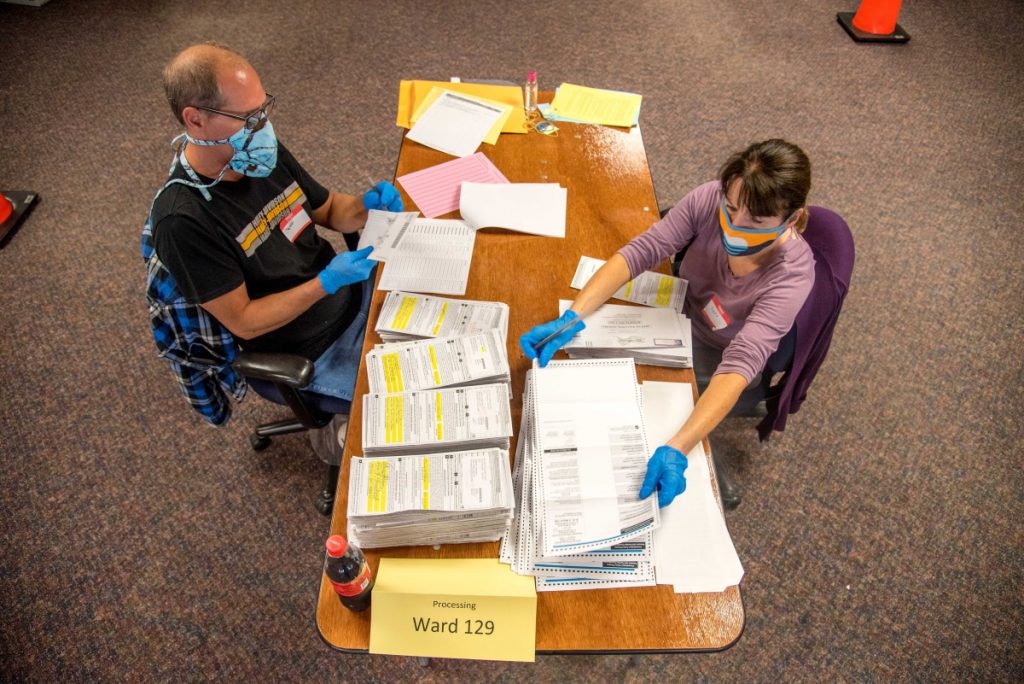Assembly Bill Would Allow Milwaukee, Other Cities To Count Absentee Ballots Early
Day-before processing seeks to end late night results.

Election workers process absentee ballots at Milwaukee’s central count facility on Aug. 11, 2020. Photo by Will Cioci/Wisconsin Watch.
Assembly lawmakers heard testimony on a slate of bills that would address concerns about Wisconsin’s election system on Tuesday, including one that would allow processing of absentee ballots to begin a day early.
Rep. Scott Krug (R-Nekoosa) told the Assembly Campaigns and Elections committee that AB 567, which would allow for “Monday processing” of absentee ballots, could help increase efficiency, while addressing skepticism about the security of elections that have cropped up in recent election cycles.
“This one thing combats most of the problems we’ve been dealing with here in the state of Wisconsin,” Krug said. “If you think back on the issues of the 2018 elections, the 2020 election, there’s always been this idea of a ballot dump at the end of the day.”
Ryan Retza, chief of staff for bill coauthor Sen. Rachael Cabral-Guevara (R-Appleton), explained that processing means that inspectors begin to review the envelope for sufficiency, announce the voter’s name and address and input the absent voters ballot into the tabulator.
The bill would not allow votes to be counted until the day of the election.
According to the National Conference of State Legislatures, at least 38 states allow for the processing of absentee ballots prior to Election Day, including in Florida and Washington.
Clerks in Wisconsin have long asked for early processing of ballots, and Claire Woodall, Milwaukee Election Commission executive director, told lawmakers on Tuesday that the bill would make a big difference.
“Just that one day significantly increases our capacity to efficiently and accurately meet statutory deadlines for processing ballots, especially in high turnout elections,” Woodall said.
Republican and Democratic lawmakers support the idea, though some lawmakers expressed concerns about the current version of the bill which includes some additional provisions.
Krug said the bill doesn’t address every concern about election efficiency and security, but that he has been cognizant of the “political realities” and tried to draft a bill that would pass the Legislature and receive approval from Gov. Tony Evers.
The bill includes a whistleblower provision that is meant to protect municipal clerks who witness and report election fraud and irregularities, a provision that requires a court to notify the Elections Commission within one business day if it rules someone is incompetent and ineligible to vote and a provision to require the verification of voters’ citizenship status.
Rep. Lee Snodgrass (D-Appleton) asked about removing the verification portions of the bill since there is a constitutional amendment that addresses that concern already. Ahead of the public hearing, the Assembly Elections and Campaigns committee passed three proposed constitutional amendments that would make it illegal for municipalities to use private money to pay for election-related costs, further strengthen Wisconsin’s strict voter ID requirements and add more safeguards against non-citizens voting during an executive session.
Krug said that he wants “as clean a bill as possible” but can’t guarantee anything because there has to be enough votes to get the bill through the legislative caucus.
Lawmakers also considered a bill — AB 572 — that would create a process for notifying families whose relatives intend to vote with the assistance of Special Voting Deputies in nursing homes.
Coauthor Rep. Joel Kitchens (R-Sturgeon Bay) said he authored the bill because of concerns about a review by Dane County that found that almost 100 people cast ballots in past elections despite being declared incompetent to vote.
Former Republican Sen. Kathy Bernier testified in support of the bill, saying that it “merely” requires a facility administrator to bring the issue to the attention of the resident’s relative when there is an upcoming election.
“I am sure that if you have a family member that needs assistance there is a lot on your mind and not just how your loved one is going to cast a ballot,” Bernier said.
Another bill — AB 543 — would guarantee that election observers would be placed a maximum of three feet away from the table where voters announce their name and address and where people register to vote. Violators of the provisions under the bill could face imprisonment for up to 90 days and a fine of up to $1,000.
Current law establishes that observers are placed a minimum of three feet and a maximum of eight feet.
Bill coauthor Rep. Paul Tittl (R-Manitowoc) told lawmakers that the bill provides election observers uniform and non-discriminatory access to all stages of the election process.
“Three feet is a closer distance from which the average person could read and observe all public aspects of our voting process including voters address and signature,” Tittl said. “Eight or more feet is quite far even for those with perfect vision.”
Evers vetoed a similar bill in 2022 because he said that it was unnecessary and because the bill could create a greater potential for observers to interfere with or intimidate election officials performing their duties.
Lawmakers on the committee expressed concerns about the proximity proposed in the current bill. Rep. Lisa Subeck (D-Madison) called the potential change a “dramatic leap.” Krug said that a clerk from Wood County told him that he thought that three feet could be too close as well.
“New voters can feel intimidated, especially voters of color, who might be the only voter of color in that particular polling location I know have felt intimidated in the past,” Snodgrass said. “This three feet is super close.”
Tittl told lawmakers that they were too focused on the three feet and said that the current range could put poll observers too far away.
“Why don’t you get hung up on the eight feet because the eight feet, you can’t observe,” Tittl said.
Lawmakers also considered two bills that would affect who and how someone could hold certain public office.
AB 476 would require that a special election is held if the secretary of state, treasurer, attorney general, and state superintendent of public instruction vacates office during the first three years of a term. If an official leaves following Jan. 1 of a year in which there is an election for the office, the governor would be allowed to fill the vacancy with the approval of the Senate.
Under current state law, the governor can fill these positions, if vacant, without Senate approval.
Rep. Gae Magnafici (R-Dresser) told lawmakers that the bill was being introduced in reaction to Evers’ appointment of Secretary of State Sarah Godlewski to the position after former Wisconsin Secretary of State Doug La Follette stepped down less than three months after his reelection. Republicans at the time called for a special election to be held to fill the seat.
“Wisconsin thrives on the principles of democracy and the trust vested in elected officials by the people, however, this trust has been shaken by recent events,” Magnafici said. “[The] departure left a significant void, which was filled by an appointment from the governor bringing an unelected bureaucrat into a critical position within our executive branch. This action not only bypasses the electoral process but undermines the democratic ideals that form the bedrock of our government’s structure.”
Subeck, a Democrat, said she was concerned that the bill could leave the state with a vacancy in a top leadership position potentially for several months, pointing out that it takes time for an election to occur.
“We could be without an attorney general. That’s concerning. We could be without a treasurer or a secretary of state. That’s concerning,” Subeck said. “Even if the governor were able to call that special election very quickly, you’d still be talking up to three months before the election’s actually held because there are the mechanics of an election.”
Magnafici told Subeck that she shares the concern, but that people are having a problem with the “integrity of the vote.”
“We just need to restore their trust and accountability in this,” Magnafici said. “There’s been other instances, where, like an assemblyman has gotten a senate job and then they call a special election and I don’t think it really takes that long of time.”
Magnafici added that others in the agencies could fill in until someone could be elected.
Lawmakers also heard testimony on AB 552, which would cap the maximum age for a state Supreme Court justice and at 75.
Bill coauthor Rep. Nik Rettinger (R-Mukwonago) told lawmakers that the bill is a reaction to growing calls from the public.
“Based on commentary from news, media, social media and our constituencies, there is now, again, a growing desire from the public for another passage of the torch,” Rettinger said.
Rettinger specified that the legislation wouldn’t affect any of Wisconsin’s current Supreme Court justices if they were to run for reelection. Justice Ann Walsh Bradley will be a few months shy of 75 years old if she runs for another 10-year term in April 2025 as she has indicated she will.
Sachin Chheda, a retired campaign consultant who ran four Supreme Court races, wrote in response to a question from the Wisconsin Examiner that the bill “sounds like a ‘solution’ in search of a problem.”
“It wouldn’t affect any sitting justice in their next re-election, nor most in their next two,” Chheda said. “Right-wing legislators should be focusing on things that really matter to Wisconsin families, addressing problems like making us safer by getting guns out of the hands of dangerous people, expanding healthcare access, addressing workforce challenges, improving education by investing in kids, and dealing with the climate crisis. Instead, we constantly get nonsense like this from their out-of-touch, far-right, partisan leadership.”
Democratic lawmakers on the committee also appeared critical of the proposal.
Snodgrass asked if the proposal seemed “a little ageist.”
“People in their mid- to late- 70s, just by virtue of their age, should not be pulled out of qualification for serving their state or their country,” Snodgrass said.
Rettinger pointed to recent complaints about the ages of officials serving in Washington D.C. According to a recent Pew Research Center survey, 79% of Americans favor maximum age limits for elected officials in Washington, D.C. and 74% support such limits for Supreme Court justices.
“I think for a very long time, there’s been a group of folks who have been in office long enough,” Rettinger said. “There’s been a couple of generations that haven’t had as many opportunities.”
Subeck questioned the proposal, saying it sounded like Rettinger is more interested in term limits but was instead going after age.
“Oftentimes folks who are elected in an older age, may not have served a lot of terms in office, they may have just gotten elected at an older age or developed an amount of experience or a type of experience that was appealing to the voters at that point,” Subeck said.
Rettinger said that that was a different conversation and that he was building off of a current provision within state law. The Wisconsin Constitution includes a provision, which was adopted in the 1970s, that allows for the Legislature to set an “age cap” on Supreme Court Justices and judges of a court of record of not less than 70 years.
UPDATE: This article was updated by the Wisconsin Examiner following initial publication.
Assembly committee considers election changes, including early absentee ballot processing was originally published by the Wisconsin Examiner.
Legislation Link - Urban Milwaukee members see direct links to legislation mentioned in this article. Join today





















I was gonna comment on the absentee counting bill.
Then these idiots want voting observers invading personal space of voters and poll workers. You can tell if someone comes in twice to vote from 8ft.
No-nonsense legislation. Vote this thru guys.